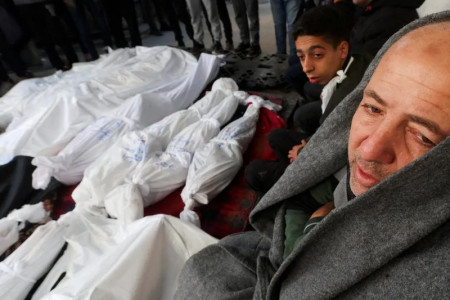Wrangles over the wording of the Security Council resolution, reportedly to avoid another veto by the US, mean the vote has moved to Wednesday.
Increased pressure for a suspension of fighting between Israel and Hamas comes as the leader of Hamas is expected to travel to Egypt for talks.
Ismail Haniyeh is due in Cairo later on Wednesday, a source told the BBC.
Egypt, alongside Qatar, helped broker a truce last month that led to a week-long ceasefire and the release of some 100 hostages captured by Hamas in exchange for hundreds of Palestinians being held in Israeli jails.
Israeli leaders have rejected a new ceasefire since then, saying it would only benefit Hamas.
But on Tuesday Israeli President Isaac Herzog said the country was ready for another pause in the fighting to enable more hostages to be released.
Hamas official Osama Hamdan told a news conference in Beirut on Monday that the group was "open to any initiative aiming for a ceasefire", but he insisted there would be "no negotiations on a hostage swap deal until the Zionist [Israeli] aggression completely stops".
The original draft Security Council resolution proposed by the United Arab Emirates (UAE) called for an "urgent and sustainable cessation of hostilities" to allow "safe and unhindered humanitarian access".
Initially diplomats thought they were very close to an agreement, 99% of the way there, but the final discussions have been complex, according to the UAE.
The US says it is engaging constructively with other members to resolve outstanding issues. Late on Tuesday, the US Deputy Ambassador to the UN, Robert Wood, was asked by the BBC whether the US supported the draft resolution and he said: "We're still working on the text with other players and I don't want to get ahead of where we are at this point. So let's just see how the discussions go this afternoon."
Diplomats say the main sticking points are how to frame calls for a cessation of hostilities and the proposal for a UN mechanism to inspect aid going into Gaza. The US, along with Israel, opposes a ceasefire because they say it would benefit Hamas. Washington vetoed a previous Security Council resolution demanding one. The UK abstained, but every other member supported it. And Israel, according to one Security Council diplomat, is pressuring the US to veto this resolution as well, out of fear that a UN mechanism to monitor aid would prevent them from controlling deliveries in Gaza.
When US state department spokesperson Matt Miller was asked whether Israel had asked the US to veto it, he said they had been in discussions with their ally, as well as other countries in the region, and they would ultimately make their own determination about what the best course of action was depending on what the final resolution stated. The current draft has already been watered down and now calls for a suspension of hostilities, rather than a sustainable cessation of hostilities, but it still includes a phrase calling for "urgent steps" towards a sustainable cessation of hostilities.
The UAE's Ambassador to the UN, Lana Nusseibeh, said the priority and focus of the resolution were to have a real impact on the ground with a scaling-up of access, the opening of all land, sea and air crossing points, and ensuring Egypt has the support it needed from the UN in the form of a mechanism to streamline the process of monitoring aid. But overriding all of that, she said, was ensuring that humanitarian workers could deliver aid safely and were protected by the normal rules of de-confliction.
But the Israeli government is under growing international pressure to agree to a ceasefire because of the mounting civilian casualties in Gaza.
It is also facing pressure at home for a deal that would see more hostages freed, after Israeli soldiers mistakenly killed three Israeli men who had been held captive in Gaza last week.
Gaza has been devastated by the war, which was triggered by an unprecedented cross-border attack by Hamas gunmen on southern Israel on 7 October, in which at least 1,200 people were killed - most of them civilians - and about 240 taken hostage.
Since then, more than 19,600 people have been killed in Gaza, about 70% of them women and children, according to the territory's Hamas-run health ministry.
It reported that about 100 Palestinians had been killed in Israeli air strikes on Tuesday.
Watch: How my family escaped bombs in Gaza for a new life in Canada
Ahead of the Security Council meeting, UN aid workers in Geneva could not hide their despair at the failure of the international community to put an end to the conflict and tackle the rapidly deteriorating humanitarian situation in Gaza.
Unicef spokesman James Elder, who recently returned from the territory, told reporters that "every single child is enduring these 10 weeks of hell and not one of them can escape".
He lamented that "not even lip service" had been paid to requirements, under international law, to safeguard medical facilities, food and water.
Only eight of Gaza's 36 hospitals are still partially functioning, according to the World Health Organization. They are overwhelmed by casualties and facing critical shortages of medical supplies and fuel for generators, as well as providing shelter for thousands of displaced people.
WHO spokeswoman Dr Margaret Harris said her colleagues in Gaza had run out of "words to describe the horror" they were witnessing. They were not even able to walk through emergency wards at "for fear of stepping on people" lying on the floor "in severe pain" and asking for food and water, she added.
By Nada Tawfik & David Gritten
BBC News, in New York and London


